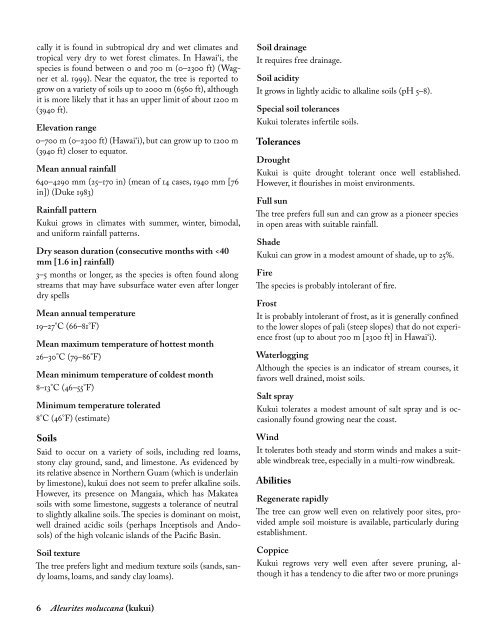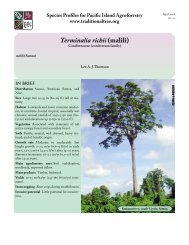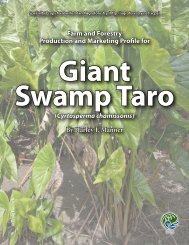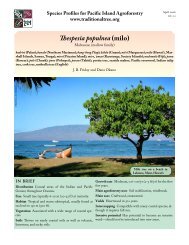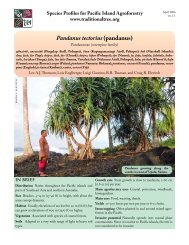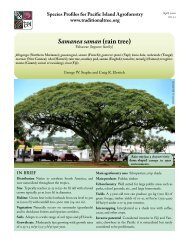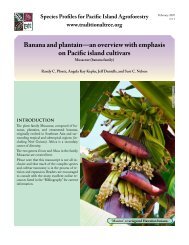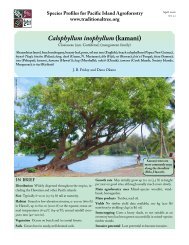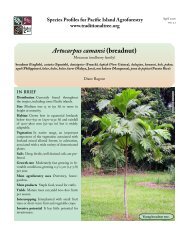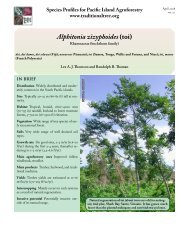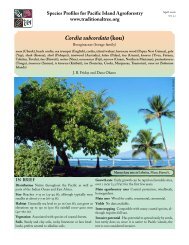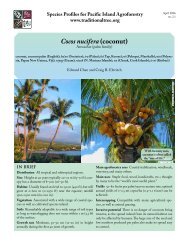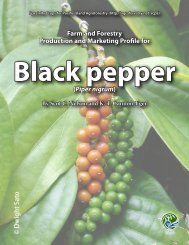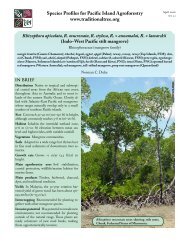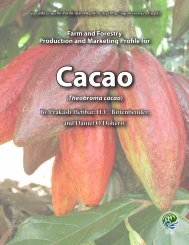Aleurites moluccana (Kukui) - Agroforestry Net
Aleurites moluccana (Kukui) - Agroforestry Net
Aleurites moluccana (Kukui) - Agroforestry Net
Create successful ePaper yourself
Turn your PDF publications into a flip-book with our unique Google optimized e-Paper software.
cally it is found in subtropical dry and wet climates and<br />
tropical very dry to wet forest climates. In Hawai‘i, the<br />
species is found between 0 and 700 m (0–2300 ft) (Wagner<br />
et al. 1999). Near the equator, the tree is reported to<br />
grow on a variety of soils up to 2000 m (6560 ft), although<br />
it is more likely that it has an upper limit of about 1200 m<br />
(3940 ft).<br />
Elevation range<br />
0–700 m (0–2300 ft) (Hawai‘i), but can grow up to 1200 m<br />
(3940 ft) closer to equator.<br />
Mean annual rainfall<br />
640–4290 mm (25–170 in) (mean of 14 cases, 1940 mm [76<br />
in]) (Duke 1983)<br />
Rainfall pattern<br />
<strong>Kukui</strong> grows in climates with summer, winter, bimodal,<br />
and uniform rainfall patterns.<br />
Dry season duration (consecutive months with < 0<br />
mm [1. in] rainfall)<br />
3–5 months or longer, as the species is often found along<br />
streams that may have subsurface water even after longer<br />
dry spells<br />
Mean annual temperature<br />
19–27°C (66–81°F)<br />
Mean maximum temperature of hottest month<br />
26–30°C (79–86°F)<br />
Mean minimum temperature of coldest month<br />
8–13°C (46–55°F)<br />
Minimum temperature tolerated<br />
8°C (46°F) (estimate)<br />
Soils<br />
Said to occur on a variety of soils, including red loams,<br />
stony clay ground, sand, and limestone. As evidenced by<br />
its relative absence in Northern Guam (which is underlain<br />
by limestone), kukui does not seem to prefer alkaline soils.<br />
However, its presence on Mangaia, which has Makatea<br />
soils with some limestone, suggests a tolerance of neutral<br />
to slightly alkaline soils. The species is dominant on moist,<br />
well drained acidic soils (perhaps Inceptisols and Andosols)<br />
of the high volcanic islands of the Pacific Basin.<br />
Soil texture<br />
The tree prefers light and medium texture soils (sands, sandy<br />
loams, loams, and sandy clay loams).<br />
<strong>Aleurites</strong> <strong>moluccana</strong> (kukui)<br />
Soil drainage<br />
It requires free drainage.<br />
Soil acidity<br />
It grows in lightly acidic to alkaline soils (pH 5–8).<br />
Special soil tolerances<br />
<strong>Kukui</strong> tolerates infertile soils.<br />
Tolerances<br />
Drought<br />
<strong>Kukui</strong> is quite drought tolerant once well established.<br />
However, it flourishes in moist environments.<br />
Full sun<br />
The tree prefers full sun and can grow as a pioneer species<br />
in open areas with suitable rainfall.<br />
Shade<br />
<strong>Kukui</strong> can grow in a modest amount of shade, up to 25%.<br />
Fire<br />
The species is probably intolerant of fire.<br />
Frost<br />
It is probably intolerant of frost, as it is generally confined<br />
to the lower slopes of pali (steep slopes) that do not experience<br />
frost (up to about 700 m [2300 ft] in Hawai‘i).<br />
Waterlogging<br />
Although the species is an indicator of stream courses, it<br />
favors well drained, moist soils.<br />
Salt spray<br />
<strong>Kukui</strong> tolerates a modest amount of salt spray and is occasionally<br />
found growing near the coast.<br />
Wind<br />
It tolerates both steady and storm winds and makes a suitable<br />
windbreak tree, especially in a multi-row windbreak.<br />
Abilities<br />
Regenerate rapidly<br />
The tree can grow well even on relatively poor sites, provided<br />
ample soil moisture is available, particularly during<br />
establishment.<br />
Coppice<br />
<strong>Kukui</strong> regrows very well even after severe pruning, although<br />
it has a tendency to die after two or more prunings


